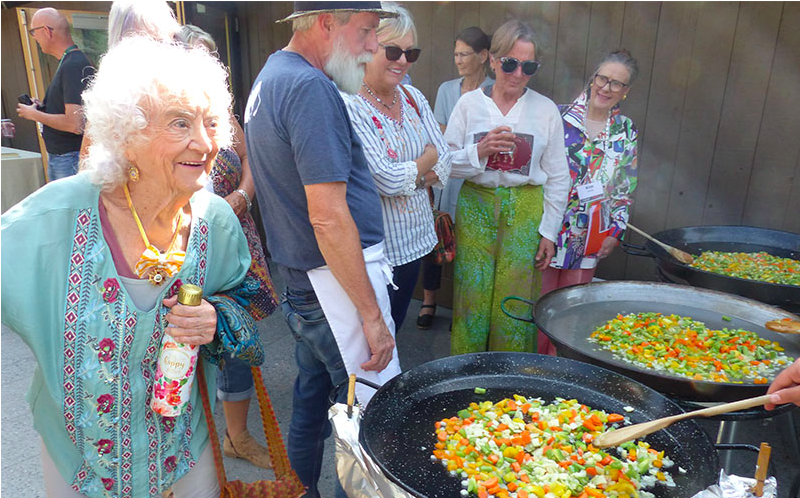Pilar Pobil was 9 the night she watched a cargo ship pull into the harbor of the Spanish island where her family lived.
Men and women wearing nothing but black pants and red banners hanging diagonally across their torsos disembarked, shooting rifles in the air and marauding through town killing at random and without mercy.
The group made their way up to the Castillo de la Mola where her father and 45 of his Naval officers were being held and gunned them down with a machine gun in seconds.
Pilar Pobil checks out the paella cooked up by the grandson of Basque boarding house owner Epi Inchausti for the Hemingway seminar.
“The death of my adored father is with me all the time,” Pobil told 175 men and women attending the 2019 Hemingway Seminar this past week at Ketchum’s Community Library.
“When I learned the truth of my father’s death, I had nightmares. For years I would scream in the middle of the night, unable to wake up. My sisters found these episodes so terrifying that none of them wanted to sleep in the same room with
It’s been 80 years since the Spanish Civil War came to a close, with the brutal dictator Gen. Francisco Franco firmly ensconced to lead a reign of terror for the next 36 years.
But those attending the seminar got a personal view of the horrors of the war through the eyes of Pobil, a 92-year-old artist now living in Salt Lake City.
Pilar Pobil painted “The Sky is the Limit,” depicting a progression of the world towards the second Millenium. It includes Columbus’s ships, as well as The Mayflower.
It was part of this year’s focus on the Spanish Civil War in conjunction with the 80th anniversary of Hemingway’s novel “For Whom the Bell Tolls,” much of which he wrote while staying in Room 206 of the Sun Valley Lodge.
Only one view of the war was allowed in Spain—that of a Christian crusade against so-called godless communism, noted Clyde Moneyhun, an English professor at Boise State University. It’s only been in the last 20 years that Spanish authors have published their accounts of the war.
The Spanish people are just now processing what happened, he added.
The war was a complicated one with many warring factions. Hemingway and others tried to rally support for the democratically elected Republicans with the film “The Spanish Earth” in the belief that if the other side wasn’t stopped war would be fought across Europe.
“Before, death came when you were old and sick…Now it comes to all in the village,” he wrote in “For Whom the Bell Tolls.”
Pobil was not spared the stench of death.
She grew up on the Mediterranean island of Mallorca, part of a large, diverse and colorful family that included wealthy grandparents who had a castle in the Pyrenees Mountains. Her father, a radio expert, was the youngest man ever to be made Rear Admiral in the Spanish Navy.
But one of Pobil’s earliest memories is that of drummers coming down the streets accompanied by men dressed in ceremonial costumes and town criers in medieval uniforms of red, blue and gold velvet proclaiming that King Alfonso XIII had been deposed. Though she didn’t understand it at the time, it was the end of the Spanish monarchy and the first steps towards civil war.
She was heading out to visit with her beloved father as he sat on their veranda overlooking harbor when she saw a man dressed in black with a red scarf—the uniform of the anarchists--pointing a machine gun at her father, who had refused to resign his commission in protest after the king was deposed.
Slowly her father got up, accompanying the man as he walked away.
“I waved to my father and he waved back,” said Pobil, who thought her father was just going out for the evening.
She never saw her father again, as he was taken to a nearby prison where he was eventually killed.
Pobil and her mother and sisters were soon evicted from the Admiral’s house. They hid in a friend’s attic.
“There were windows,” Pobil said, “But we weren’t allowed to open them because we might be discovered by snipers who shot at everything that moved.”
From her window, Pobil had a front-row seat to watch rebels took artifacts from the Catholic Church and set them afire in the streets while singing the hymn of the French Revolution.
Occasionally, her mother let Pilar and her sister out for a walk in the evening, while she herself remained hidden. Pobil always wanted to walk by the hospital where she had been told her father was recuperating from illness.
“Later I found out my father had never been in the hospital, that he had been taken prisoner, instead,” she said.
Her mother pawned off some of her jewelry in exchange for a small apartment and scarce food available only on the black market. Since the apartment above theirs was the headquarters of one of the political factions, they spent their time there speaking in whispers and watching men and women as they emerged and returned.
“Life consisted of so many secrets. You didn’t know who your friends were. And the lack of trust even extended to relatives. Some of our relatives supported Franco. Others did not,” Pobil said.
Since Mallorca had been captured by the other side, Pobil’s mother decided to go to Barcelona and then to Alicante to the home of Pobil’s aunt and uncle.
Under the cover of night, they boarded a ship that was in such disrepair that no one had bothered to confiscate it. They waited nervously for hours to leave when a group of militiamen dressed in black with red kerchiefs boarded the ship, guns pointed. They searched one woman, forced everyone to disembark and gunned the woman down in front of them.
Pobil’s family returned to their apartment while her mother set about trying to find another boat. Pobil’s wealthy uncle got them fake passports and they hid in an oil tanker waiting for a German transatlantic ship used to transport troops.
They had to take a small boat to reach the ship.
“The sea very rough, washing over us, leaving us shaking with cold,” Pobil said, swinging her arms from side to side in a demonstration. “My mother screamed. I screamed.”
Pilar’s family wanted to go to the Netherlands but got off in Lisbon, Portugal, instead to join Cousin Isabel and her husband Nicolas Franco-- Gen. Franco’s brother--who had escaped on foot through the Pyrenees.
Finally, they arranged to return home to Mallorca. But the war continued to rage with airplanes flying over on bombing raids and sirens wailing in the middle of the night, prompting them to take shelter in tunnels used by cargo trains.
When the war ended Pilar was educated in a convent, developing a great distaste for beans as food remained scarce. She was 27 when she met an American named Walter, who was spending a year in Mallorca with his sister. She followed him to Salt Lake City where they married; they named their first son Luis for Pilar’s father.
At first, the distance seemed enormous as she was confronted with things she’d never seen, including corn on the cob and avocados. But she found the deserts of southern Utah, which seemed familiar thanks to the many Zane Grey novels she’d read, fitting inspiration for her art.
“When you leave your native land for good, your life is cut in two,” she said. “The first part retreats inside to allow the second part to develop. It becomes a hidden part of yourself that not many see.”
But Pilar’s love for her homeland did show—in the colorful paintings she made of Spain’s marketplaces, in her eclectic furnishings evoking Spanish culture, in the meals she cooked and in her colorful garden. It also shows in her book, “My Kitchen Table,” which she gifted to the library. The book recounts vignettes from the Spanish Civil War, as well as of daily life as lived by her family.
She opens her home regularly for Art in the Garden events to raise money for favorite causes and organizations. She educates schoolchildren who come to her house, teaching them about the value of art. And she has made her home a haven for sprouting artists.
During her visit to Sun Valley she proudly wore a medal around her neck. Pobil received the Cruza de Oficial de la Real Orden de Isabel la Catolica from King Felipe IV for helping to expand the story and culture of Mallorca and Spain beyond its borders.
“The world is a pretty messy place. I use whatever power I have to show that there are beautiful things surrounding us,” she said.
Pobil clearly relished telling her story and answering the questions that followed. But she had one warning for the crowd.
“When I came to America, I was impressed by how you had two big political parties and how they could work together and get things done. But that’s not the case anymore. And Mr. Trump is like Franco—he wants to be emperor. Remain vigilant. If you don’t speak up, you don’t have the right to complain.”

